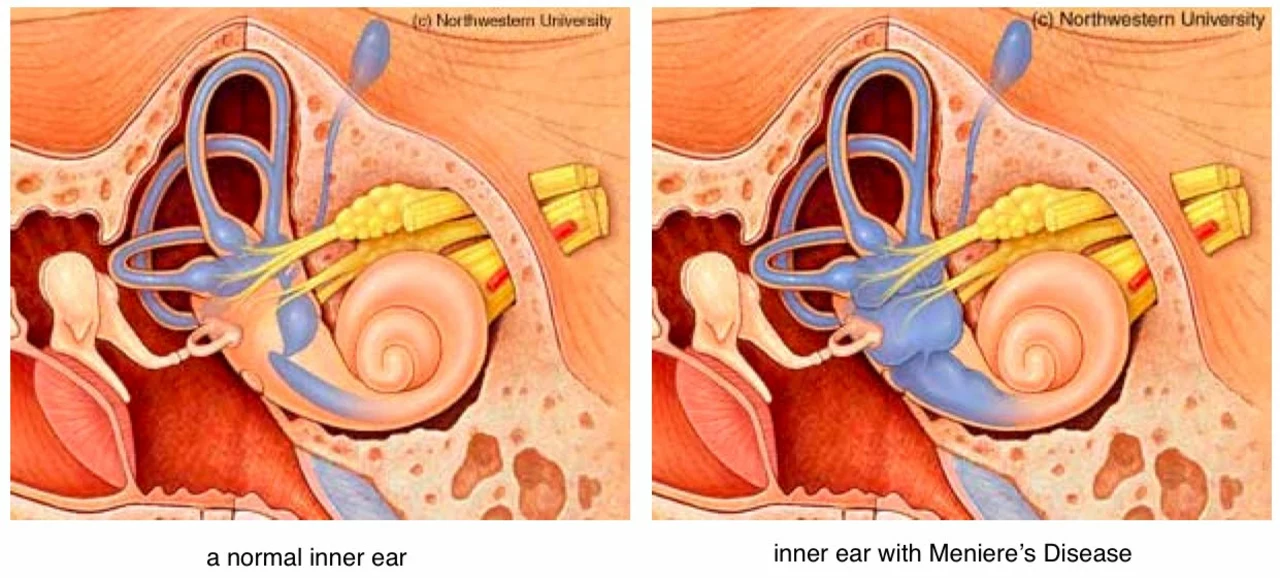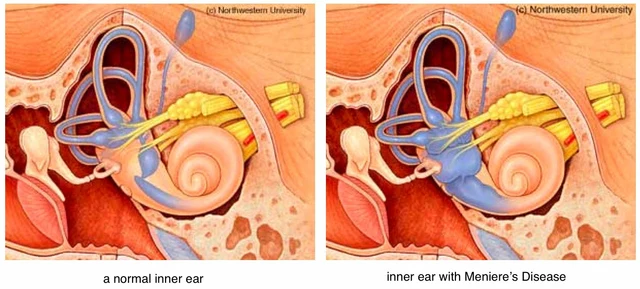Understanding Meniere's Disease in Children
Meniere's disease is a disorder of the inner ear, which can lead to a variety of symptoms, such as vertigo, hearing loss, and tinnitus. Although it is more common in adults, children can also be affected by this condition. In this section, we will explore the causes and symptoms of Meniere's disease in children, as well as the challenges they may face.
While the exact cause of Meniere's disease is still unknown, several factors have been linked to the condition, including genetics, viral infections, and autoimmune reactions. In children, the symptoms can be particularly distressing, as they may struggle to communicate their discomfort and experience difficulties with balance and coordination. Early diagnosis and appropriate treatment are essential in managing the condition and improving the child's quality of life.
Introducing Betahistine as a Treatment Option
Betahistine is a medication that has been found to be effective in treating the symptoms of Meniere's disease in some cases. It works by improving blood flow to the inner ear, thereby reducing the frequency and severity of vertigo attacks. In this section, we will delve into the benefits of betahistine for children with Meniere's disease and discuss how it may help alleviate their symptoms.
Although betahistine is not specifically approved for use in children, it is considered a safe and well-tolerated medication. Studies have shown that betahistine can help to reduce vertigo and improve balance in patients with Meniere's disease, which can be particularly beneficial for children who struggle with these symptoms. Furthermore, betahistine has been found to have a positive impact on hearing and tinnitus, which can significantly improve a child's overall well-being.
Dosage and Administration of Betahistine in Children
As with any medication, it is crucial to ensure that betahistine is administered correctly to children. In this section, we will discuss the appropriate dosage and administration of betahistine for children with Meniere's disease, as well as any potential side effects to be aware of.
While there is no official recommended dosage of betahistine for children, it is generally advised to start with a low dose and gradually increase it based on the child's tolerance and response to the medication. It is essential to consult with a healthcare professional to determine the appropriate dosage for your child. Betahistine is typically taken in tablet form, and it may be taken with or without food.
Some possible side effects of betahistine include gastrointestinal issues, such as nausea and stomach pain, as well as headache and dizziness. It is important to monitor your child for any adverse reactions and report them to your healthcare provider.
Alternative Treatment Options for Children with Meniere's Disease
While betahistine can be effective in managing the symptoms of Meniere's disease in children, it may not be suitable for everyone. In this section, we will explore alternative treatment options for children with Meniere's disease, including lifestyle changes, other medications, and surgical interventions.
Lifestyle changes, such as reducing salt intake and managing stress, can help to minimize the frequency and severity of vertigo attacks in children with Meniere's disease. Additionally, other medications, such as diuretics and anti-vertigo drugs, may be prescribed by a healthcare professional to help manage symptoms. In more severe cases, surgical interventions, such as endolymphatic sac decompression or vestibular nerve section, may be considered to help alleviate symptoms.
Monitoring Your Child's Progress and Adjusting Treatment
As with any medical condition, it is important to closely monitor your child's progress and adjust their treatment plan as needed. In this section, we will discuss the importance of regular check-ups and communication with your child's healthcare provider, as well as the potential need for adjustments to their treatment plan.
Regular check-ups with your child's healthcare provider are essential in monitoring their response to treatment and ensuring that their symptoms are well-managed. It is important to discuss any concerns or changes in your child's condition with their healthcare provider, as this may indicate a need for adjustments to their treatment plan. This may include modifying the dosage of betahistine, trying alternative medications, or exploring other treatment options.
Supporting Your Child Through Their Meniere's Disease Journey
Living with Meniere's disease can be challenging for children, and it is important for parents and caregivers to provide support and encouragement throughout their journey. In this section, we will discuss ways to help your child cope with their symptoms and improve their overall quality of life.
Encourage open communication with your child about their symptoms and how they are feeling, as this can help them feel more comfortable discussing their condition. Provide reassurance and emotional support, and help them to develop coping strategies for managing their symptoms, such as relaxation techniques and deep breathing exercises. Additionally, work with your child's school to ensure they have the necessary accommodations and support in place to help them succeed academically and socially.
Seeking Professional Help and Resources
Dealing with Meniere's disease in children can be overwhelming, and it is crucial to seek professional help and resources to ensure your child receives the best possible care. In this section, we will discuss the importance of consulting with healthcare professionals and accessing support groups and educational resources to help you and your child navigate their Meniere's disease journey.
Work closely with your child's healthcare provider to develop an appropriate treatment plan and ensure that their symptoms are well-managed. Seek out support groups and educational resources, both online and in-person, to connect with other families facing similar challenges and learn more about managing Meniere's disease in children. By arming yourself with knowledge and support, you can help your child lead a fulfilling and healthy life despite their condition.
Conclusion: Betahistine's Role in Managing Meniere's Disease Symptoms in Children
In conclusion, betahistine can play a significant role in managing the symptoms of Meniere's disease in children. While it may not be a suitable treatment option for everyone, it has been found to be effective in reducing vertigo, improving balance, and alleviating hearing loss and tinnitus in many cases. It is essential to work closely with your child's healthcare provider to develop an appropriate treatment plan and monitor their progress, making adjustments as needed to ensure their symptoms are well-managed and their quality of life is improved.
By providing support, encouragement, and appropriate medical care, you can help your child navigate their Meniere's disease journey and lead a happy, healthy life.








Sage Druce
June 13, 2023 AT 08:51Not a miracle but way better than the dizziness spells that left her curled up for hours
Tyler Mofield
June 14, 2023 AT 05:55Pharmacokinetic data in children under 12 remains insufficient to support routine clinical application
Patrick Dwyer
June 15, 2023 AT 01:14Start low 4mg twice daily watch for GI upset
Most kids tolerate it better than we expect and the reduction in vertigo frequency is measurable on balance testing
It's not a cure but it buys time for other interventions
Bart Capoen
June 15, 2023 AT 07:10used to fall over walking down the hall now she can run track
doc said its off label but the side effects are way less than the old anti-nausea meds
still no clue why it works but hey if it helps dont fix it
luna dream
June 15, 2023 AT 13:39The real cause is glyphosate in the water supply and the government hides it
They don't want you to know that inner ear fluid is affected by Roundup
Look up the EPA documents they redacted
Linda Patterson
June 15, 2023 AT 21:14Back in my day we just sat still and didn't move when dizzy
Now parents rush to the pharmacy like it's a grocery store
This betahistine nonsense is just another example of medical overreach
Jen Taylor
June 16, 2023 AT 14:23She went from missing school weekly to acing her science fair
Start with 8mg twice a day, keep a symptom journal, and don't rush the dosage
Also please please please find a pediatric ENT who actually listens
You're not alone in this
Shilah Lala
June 17, 2023 AT 12:24Next they'll inject them with glitter to fix their bad posture
At this point I'm just waiting for the FDA to approve TikTok as a treatment for existential dread